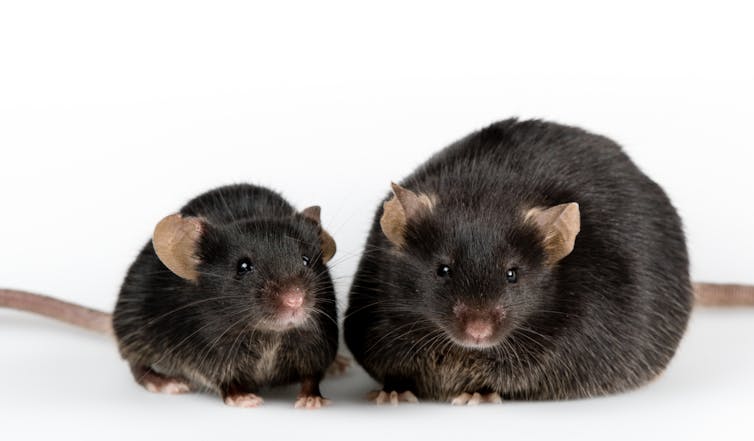Gut health: does exercise change your microbiome?
The diverse, non-human life forms that live in our guts – known as our microbiome – are crucial to our health. A disrupted balance of these contribute to a range of disorders and diseases, including obesity, diabetes, inflammatory bowel disease. It could even affect our mental health.
It’s well known that the microbes living in our guts are altered through diet. For example, including dietary fibre and dairy products in our diets encourages the growth of beneficial bacteria. But mounting evidence suggests that exercise can also modify the types of bacteria that reside within our guts.
One study found exercise promotes the growth of bacteria which produce the fatty acid, butyrate. Butyrate can promote repair of the gut lining and reduce inflammation, therefore potentially preventing diseases such as inflammatory bowel disease and insulin resistance, which leads to diabetes. Exercise-induced shifts in the gut microbiota can also guard against obesity and improve metabolic function.
Microbiome changes can even be seen following quite modest exercise regimes. One study found that women who performed at least three hours of light exercise – such as a brisk walk or swim – per week had increased levels of Faecalibacterium prausnitzii, Roseburia hominis, and Akkermansia muciniphila compared with sedentary individuals.
F. prausitzii and R. hominis reduce inflammation, while A. muciniphila has been associated with a lean body mass index (BMI) and improved metabolic health. This means that these microbiome changes are likely to be beneficial to overall health.
But it appears that the type of exercise also has different effects on the changes seen in the gut microbiota. Studies of rodents found that being forced to run on a wheel induced different microbiota changes compared to moderate exercise done when the mouse wanted to. There’s some evidence that the same is true in humans.
Athletes also have very different microbiota profiles compared to sedentary people of similar age and sex. Athletes had more diverse microflora, and a higher abundance of the three bacterial species mentioned above.
However, it still remains to be definitively proven that exercise can act independently of diet in making these changes. People who exercise may be more likely to also eat a healthier diet, so separating the two factors apart can be somewhat difficult.
Diet versus exercise
Animal studies, mainly on rodents, can shed some light on this conundrum as their diet is easily controlled. In mice, diet and exercise appear to induce very different changes in the microbiota. Some changes caused by a high fat diet – including an increase in Firmicutes and Proteobacteria, which are linked to type two diabetes and obesity – can be reversed by exercise.

Other studies suggest that exercise-induced changes in the microbiota can be brought about independent of dietary intake – though other studies show dietary changes are required alongside exercise for these to occur. Exercise may even counteract some of the negative effects of a high fat diet, but not all.
Regardless, exercise may still help the good bacteria in our gut, called A. muciniphila, stick to the stomach lining. This better promotes mucus secretion which is important as mucus protects the bacteria from being carried out of the intestine with the digested food.
Studies looking at the immune system have also found that exercise decreases inflammatory signals and promotes a more “regulated” environment, in the gut lining and beyond. This reduces the chances of developing gut diseases. What’s really interesting about A. muciniphila is that it has been found to reverse weight gain from a high fat diet and insulin resistance in mice.
This study also showed that giving mice A.muciniphila also caused an increase in the cannabis-like molecules that our bodies naturally make, termed endocannabinoids. Among other functions in the body, endocannabinoids are involved in controlling gut inflammation and our gut barrier (the front-line molecules that provide a physical immune defence from external attacks).
The endocannabinoid system is also involved with feeding behaviour by controlling brain signals. Specific endocannabinoids are increased when we feel hungry, and released in the gut when we feel full. The endocannabinoid system is overactive in people who are obese.
Different gut bacteria can change the levels of the different components that make up the endocannabinoid system. Researchers used prebiotics to change microbial composition in mice. They saw a decrease of one type of endocannabinoid and a cannabinoid receptor in an obese mouse. They also saw that the prebiotics made bacteria and toxins less able to pass from the mouse’s gut into its bloodstream.
This led to reduced bacterial components found in the blood and reduced fat cell production. A healthy diet improves the diversity and richness of gut bacteria, as does exercise – possibly even through the same few bacterial species mentioned earlier. Although this needs to be tested in humans, the results from these studies show the potential interaction between the microbial population in the gut with diet and exercise to bring about an improved metabolism.
More recently, researchers have shown runners and cyclists produce more endocannabinoids in their blood, which provides some pain relief and improves mood. However, it’s not known whether these changes are short lived or whether they bring about long-term changes in the gut microbiome.
It is tempting to speculate that exercise can change the composition of the gut microbiome and influence well-being, all through a system that has the ability to have a three-way conversation. It remains to be seen if we can manipulate this through diet and/or specific probiotics – but we should not underestimate how we are shaped by our gut residents both at the metabolic and physical level.
Rachael Rigby, Senior Lecturer in Gastro-Intestinal Health, Lancaster University and Karen Wright, Lecturer in Biomedical and Life Sciences, Lancaster University
This article is republished from The Conversation under a Creative Commons license. Read the original article.


















